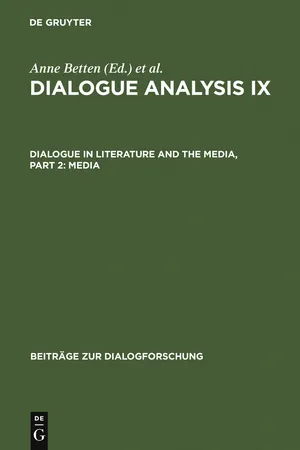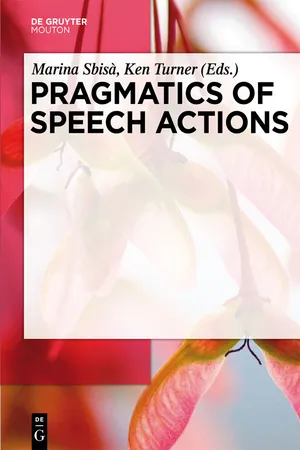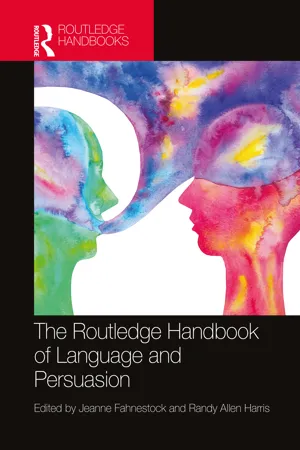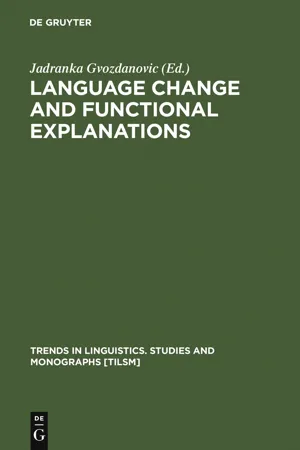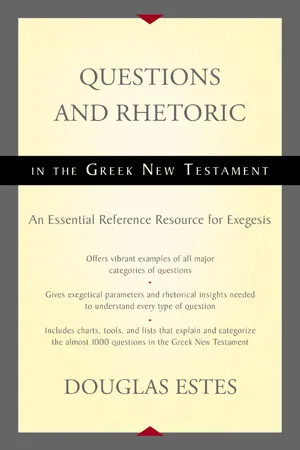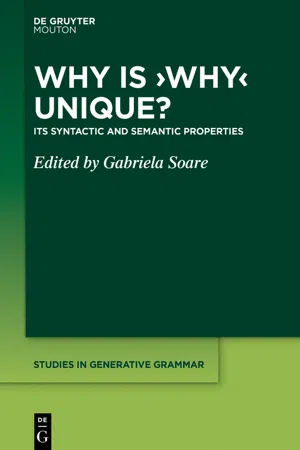Languages & Linguistics
Rhetorical Question
A rhetorical question is a figure of speech in the form of a question that is asked to make a point rather than to elicit an answer. It is used to emphasize a particular idea or to engage the audience in a thought-provoking manner. Rhetorical questions are commonly employed in speeches, literature, and everyday conversation to create impact and draw attention to a specific topic.
Written by Perlego with AI-assistance
Related key terms
1 of 5
6 Key excerpts on "Rhetorical Question"
- eBook - PDF
Dialogue Analysis IX: Dialogue in Literature and the Media, Part 2: Media
Selected Papers from the 9th IADA Conference, Salzburg 2003
- Anne Betten, Monika Dannerer, Anne Betten, Monika Dannerer(Authors)
- 2011(Publication Date)
- De Gruyter(Publisher)
Kamila Karhanovci Rhetorical Questions in polemical media dialogue 1. Introduction The Rhetorical Question ranks among those figures of speech that are the most widely used: it is to be found in poetry, in the Bible and in ordinary conversation, in conjugal disputes or in political polemics. On the other hand, the Rhetorical Question - at least as far as I know -is not one of those figures of speech to which much attention is paid in literary theory or lin-guistics, it seems to be regarded as a banal phenomenon of little interest to researchers. Dealing in my dissertation with the issue of Rhetorical Questions in media dialogues, in par-ticular those involving political argumentation, I find this phenomenon on the contrary to be very complex and by no means unproblematic. Of the many aspects which this subject in-cludes I focus above all on the following issues: How can the participants in a dialogue recognise that an utterance is a Rhetorical Question? What reactions to such utterances are possible and which ones are actually selected by the participants? What are the functions and effects of Rhetorical Questions in this genre of dialogue? 2. Defining Rhetorical Question To define 'Rhetorical Question', literature refers to its answer or, to be exact, to the hypothet-ical answer to a Rhetorical Question. For instance, Lausberg's Handbuch der literarischen Rhetorik (1960, p. 379, §767) says that a Rhetorical Question is a question to which no an-swer is expected: Die interrogatio ist der Ausdruck eines gemeinten Aussagesatzes als Frage, auf die keine Ant-wort erwartet wird, da die Antwort durch die Situation im Sinne der sprechenden Partei als evi-dent angenommen wird. Other definitions do not mention the speaker's expectations, merely observing - as a popu-lar handbook Persuading People. An Introduction to Rhetoric by the Cockrofts (1992) does - that the answer to this question is by implication obvious (p. 157). Certain more detailed - eBook - PDF
- Marina Sbisà, Ken Turner, Marina Sbisà, Ken Turner(Authors)
- 2013(Publication Date)
- De Gruyter Mouton(Publisher)
Rhetorical Questions are formal, but not functional questions. To discount Rhetorical Questions as not being genuine questions is in agreement with most linguists’ understanding of Rhetorical Questions. In her study on questions and their responses in Tzeltal, Penelope Brown writes that “Rhetorical Questions (which comprised 22 % of the Tzeltal data) were omitted, as they have quite different sequential implications” (Brown 2010: 2628). In other words, while questions are asked in order to get answers – a question makes an answer relevant – Rhetorical Questions do not make any answers relevant, since their illocutionary point lies elsewhere. Likewise, Cornelia Ilie in her study on what people do with Rhetorical Questions notes that “[a] Rhetorical Question is a question used as a challenging statement to convey the addresser’s commitment to its implicit answer, in order to induce the addressee’s mental recognition of its obviousness and the acceptance, verbalized or non-verbalized, of its validity” and a Rhetorical Question’s “main dis-cursive functions” is to “ induce, reinforce, or alter assumptions, beliefs, or ideas, in the addressee’s mind ” (Ilie 1994: 128). One way to understand Rhetorical Questions is to view them as indirect speech acts. An indirect speech act is a speech act where the speaker performs (or makes as if to perform) one speech act, while also indirectly performing another speech act. The latter speech act is the performance’s main (or only) illocutionary point. Searle’s classic example of an indirect speech act is the utterance of the question Can you reach the salt? in order to perform the speech act of requesting that the addressee pass the speaker the salt (Searle 1979a). According to Searle “a speaker may utter the sentence ‘Can you reach the salt?’ and mean it not merely as a ques-tion but as a request to pass the salt” (Searle 1979a: 30). - Jeanne Fahnestock, Randy Allen Harris, Jeanne Fahnestock, Randy Allen Harris(Authors)
- 2022(Publication Date)
- Routledge(Publisher)
Their distinctive feature consists in contextualizing multi-functional and multi-layered speech acts that display a dual illocutionary force through a mismatch between the interrogative form and the assertive function. Apart from its primary function as a challenge, the Rhetorical Question “is intended to fulfill at the same time one or several more discursive functions, such as a reproach, a warning, an objection, a promise, a self-exculpation, an accusation” (Ilie 1994 : 46). Whether deliberately or non-deliberately, by asking a Rhetorical Question, language users are trying to shift the audience from passive listeners to active participants. An important role of Rhetorical Questions is to establish or reinforce a connection with the audience, which is essential in persuasive communication. A telling example is Barack Obama’s Rhetorical Question: “My fellow Americans, is this how we want to treat our veterans?” Obama is obviously stating indirectly “this is not how we should treat our veterans,” but by putting it in a question he generates an implicit answer (no!), meant to engage the audience to consciously share his view. Depending on the addresser’s status, power, and rhetorical skills, the persuasive force of Rhetorical Questions can exert stronger or weaker psychological and moral pressure on the interlocutor and/or audience to make them accept the standpoints put forward, as argued by cognitive psychologists. According to the findings of Petty et al. (1981), the effectiveness of Rhetorical Questions depends on how much thought or issue-relevant thinking (i.e., elaboration) participants are engaged in while listening to a message. That is, when participants were not initially motivated to attend to the message, Rhetorical Questions intensified the processing of the message content, suggesting that the questions may help in the creation of strong attitudes, even when topics have low personal relevance- eBook - PDF
- Jadranka Gvozdanovic(Author)
- 2011(Publication Date)
- De Gruyter Mouton(Publisher)
The concluding section contains a discussion of the empirical results with particular attention to the functional explanation of diachronic changes in the use of pragmalinguistic categories. 2. The pragmalinguistic characterization of Rhetorical Questions In the literature on the subject, it is usually put forward that Rhetorical Questions convey assertive information. This is equivalent to stating that they are functionally opposed to informative questions, since these do not serve to communicate but rather to elicit assertive information. 3 In current speech-act theory, informative questions are considered to be manifestations of direct speech acts, that is, speech acts characterized by the expression of not more than one illocutionary point. However, in formulating a Rhetorical Question the speaker communicates more than that which he actually states, because the literal performance of the 222 Henk Haverkate interrogative act implies the performance of a non-literal assertive act. It is for this reason that Rhetorical Questions qualify as indirect speech acts. 4 Furthermore, it has often been stated that speakers uttering a Rhetorical Question don't expect the listener to give an answer to that question, and, normally, an answer is refrained from being given. In this respect, Rhetorical Questions are distinct from indirect directives, such as Can you pass the salt?, where the cooperative interlocutor, who wishes to comply with the speaker's request of the speaker, frequently gives an affirmative answer to the literal question. Nowadays, it is customary to look at indirect speech acts from the point of view of conversational implicatures which derive from the flouting of Gricean maxims. In the case of Rhetorical Questions, the first maxim that comes to mind is the maxim of quality, which, in its canonical form, is defined as follows: Try to make your contribution one that is true (Grice 1975: 45). - eBook - ePub
Questions and Rhetoric in the Greek New Testament
An Essential Reference Resource for Exegesis
- Douglas Estes(Author)
- 2017(Publication Date)
- Zondervan Academic(Publisher)
Example (2) is a highly biased question (“even” and “any” being key bias words; §4.U), formed as a negative polar question (§4.T). In this case, the semantic bias inserted into the question pushes the hearer to answer the thinly veiled challenge to their driving ability. More so, the hearer of such a question may begin to harbor fears about their driving ability as a result of the strong rhetoric of the question. The question still has an informational quality, though, as the receiver of the question will most likely have to answer in some way so as to defend (what they perceive of) their driving ability.On the level of pragmatics, the strongest rhetorical effects are in play, to the point that questions may come across almost as assertions:(3) Hello? Can you take my order now? (PRAGMATIC ) In the case of the double question (§5.D.1) in (3), the asker uses a pragmatic strategy to strongly push the hearer (into taking the asker’s order). The use of the first question, “Hello?” is a phatic question (§4.K) meant to “wake up” the hearer — and soften them up for the second part of the double-question combination (most likely a confirmation question [§4.R] or a request question [§4.S]). The question string still has informational qualities, as the asker seeks to know from the hearer if the hearer is awake and able to take the asker’s order. The rhetorical expectation placed on the hearer is that they will comply with the asker’s aggressive push (or, perhaps, respond negatively). To summarize the general rules from §2.C.4, when it comes to rhetorical quality, semantics can trump syntax, and pragmatics can trump both.The category of Rhetorical Question is so broad as to be practically meaningless when it comes to understanding the purpose of a question.To bring the conversation back full circle, the concept of the “Rhetorical Question” is a modern idea that is so broad as to lack any explanatory power. The idea that “Rhetorical Questions” are simply assertions does not bear out when one considers questions on their own terms in light of their erotetic logic. And yet, the rhetorical force of interrogatives is similar to assertive force in many ways. They are not the same, but they both do rely on a type of rhetorical strategy common to human communication. This rhetorical strategy is what makes questions seem assertive and causes assertions to prompt questions. - eBook - PDF
Why is 'Why' Unique?
Its Syntactic and Semantic Properties
- Gabriela Soare(Author)
- 2021(Publication Date)
- De Gruyter Mouton(Publisher)
Why Rhetorical Questions? 289 References Caponigro, Ivano & Jon Sprouse. 2007. Rhetorical Questions as questions. Proceedings of Sinn und Bedeutung, vol. 11, 121–133. Cheng, Lisa L-S. This volume. What -as-Why Sentences in Cantonese. In Gabriela Soare (ed.), Why is ‘Why’ Unique? Its Syntactic and Semantic Properties , Berlin: De Gruyter Mouton. Ginzburg, Jonathan. 2012. Meaning for Conversation . Oxford: Oxford University Press. Grice, Herbert Paul. 1975. Logic and conversation. In Cole, P. & Morgan, J.L. (eds.), Syntax and Semantics, volume 3: Speech acts , 225–242. New York: Seminar Press. Groenendijk, Jeroen & Martin Stokhof. 1990. Partitioning Logical Space. 02(August). Guerzoni, Elena. 2004. Even-NPIs in YES/NO Questions. Natural Language Semantics 12(4). 319–343. Han, Chung Hye. 2002. Interpreting interrogatives as Rhetorical Questions. Lingua , vol. 112, 201–229. Horn, Laurence. 1989. A natural history of negation . Chicago: University of Chicago Press. Karttunen, Lauri. 1977. Syntax and semantics of questions. Linguistics and Philosophy 1. 3–44. Khalaily, Samir & Edit Doron. 2015. Colloquial Modern Hebrew Doubly-marked Interrogatives and Contact with Arabic and Neo-Aramaic Dialects. Journal of Jewish Languages . Brill 3(1–2). 116–131. Krifka, Manfred. 1995. The semantics and pragmatics of polarity items. Linguistic analysis 25(3–4). 209–257. Progovac, Ljiljana. 1993. Negative polarity: Entailment and binding. Linguistics and Philosophy 16(2). 149–180. Rosta, Andrew & James D. McCawley. 2000. The Syntactic Phenomena of English. Language 79 (3). 614–625. Sadock, Jerrold. 1971. Queclaratives. Seventh Regional Meeting of the Chicago Linguistic Society, vol. 7 , 223–232. Sadock, Jerrold. 1974. Toward a linguistic theory of speech acts . Language . Vol. 52. New York: Academic Press. Sauerland, Uli & Kazuko Yatsushiro. 2014. Remind-me presuppositions and Speech-Act Decomposition: Japanese kke and German wieder . Berlin, ZAS: Ms. Shlonsky, Ur & Gabriela Soare. 2011.
Index pages curate the most relevant extracts from our library of academic textbooks. They’ve been created using an in-house natural language model (NLM), each adding context and meaning to key research topics.
